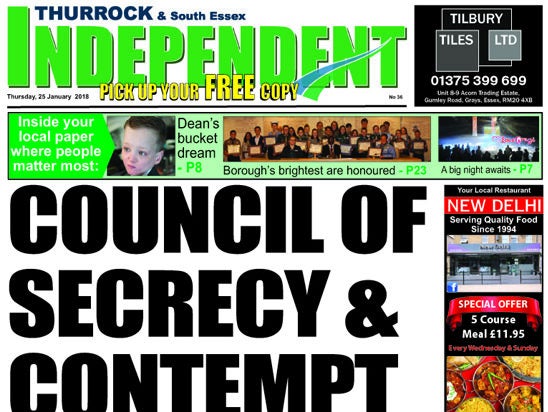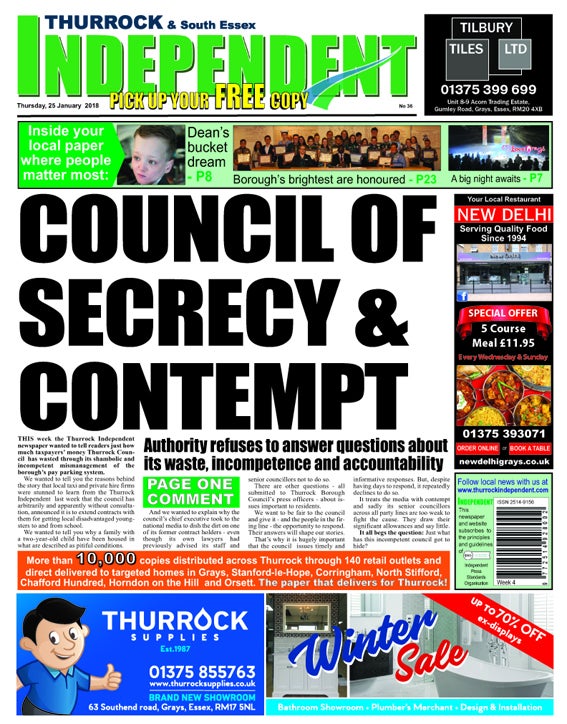
An Essex council has effectively put a “ban” on responding to queries from its local newspaper over the next six months, the paper’s editor has said, after he was accused of being “vexatious and unreasonable”.
Thurrock Council’s chief executive Lyn Carpenter emailed Thurrock Independent editor Neil Speight on 3 August informing him the local authority would no longer respond to his enquiries due to “repeated breaches of appropriate working practices”.
The letter said communications from Speight would be read and placed on file, but not acknowledged or responded to by the council, and that this policy would only be reviewed on 3 February 2019.
Speight has said the council “will no longer respond to questions and communications posed to the authority relating to the way the council operates”.
In an article in which he published the correspondence, Speight, who has edited newspapers in Thurrock since 2004, said: “Effectively she is placing a ban on any response by the authority to investigative reporting by the newspaper.”
“Quite frankly I thought there was nothing left that Thurrock Council under the current administration could do to surprise me, but then again it appears I have underestimated Ms Carpenter’s passion for secrecy and the absolute contempt she appears to have for democracy and the residents of Thurrock as she seeks to hide failings of the authority under her guidance,” Speight wrote.
“This ruling from her directly to myself is shocking – what will be all the more shocking is if the elected representatives of Thurrock Council do not immediately respond by forcing her to revoke it. I cannot believe that senior councillors have been consulted about this decision and approved her actions, but if that is so, shame on them too.
“There can be no place for a council that will not bear a challenge to its workings, nor one that deems it cannot be held accountable.”
Press Gazette contacted Thurrock Council for clarification over whether it will still respond to queries from the newspaper from staff other than Speight, but the authority said it was unable to comment on the specifics of individual cases.
A previous letter sent to Speight on 15 May by Lee Henley, strategic lead for information management, set out his “unnecessary, unprofessional and wholly inappropriate” behaviour which had apparently led the council to consider the policy.
The behaviour included public critique of media statements, emailing council officers instead of the communications team, publishing internal council communications between managers and councillors, and shouting and swearing at an election count.
In his response Speight apologised for the last offence, saying he “became annoyed” after media were unable to hear the election results as they were declared despite several requests to solve the problem, but challenged each of the other points.
The council’s letter said: “Due to the ongoing vexatious and unreasonable nature of your contact with the council in recent weeks, the council is now considering ceasing contact and engagement with you in line with the Unreasonably Persistent Complainants and Unreasonable Behaviour Procedure.”
Earlier this year Thurrock Council complained to the Independent Press Standards Organisation over a front page comment piece in the Independent headlined: “Council of secrecy and contempt”, with the sub-headline: “Authority refuses to answer questions about its waste, incompetence and accountability.”

The article said there were questions for the council to answer on a number of issues but that its press officers had not responded despite having days to do so, adding the authority “treats the media with contempt”.
The council argued it was inaccurate to say it had “refused to answer questions” as answers had either previously been provided or the questions had not been asked clearly enough.
Although IPSO raised some concerns about the way the newspaper communicated with the council – including its unclear questions and the large volume of correspondence which was not always relevant to the requests – it ruled the authority had not responded in time for the weekly print deadline and the paper was entitled to characterise this as a “refusal” to answer.
Carpenter’s ban on Speight came just days after IPSO announced it had not upheld the council’s complaint.
In his article, Speight added: “I thought the recent IPSO judgement might have brought Ms Carpenter to her senses but it appears to have tipped her over the edge. How fit she is to run this council I leave to others to judge, but I would hope 49 councillors will stand as one and challenge this affront to democracy.”
The Thurrock Independent received support from the two opposition parties on the council this week.
Labour councillor John Kent said on Twitter it was an “unprecedented and outrageous attack on the press and is a decision that Thurrock Council must reconsider as a matter of urgency”, while Your Thurrock reported that Labour group leader Oliver Gerrish said: “We need more engagement from the council, with residents, stakeholders and local media – not less.”
Thurrock Independents, the third largest party on the council, issued a statement saying its councillors were “incredibly concerned” by the decision to “blacklist” the newspaper.
Independents group leader Cllr Luke Spillman said: “This is a deeply worrying step by Thurrock Council’s minority Tory administration. An administration that continues to show breathtaking arrogance and contempt for democratic scrutiny.
“Now we see the Tories banning newspapers. Someone needs to remind them that this is Thurrock not North Korea.
“This step was taken without consulting the majority of councillors, who have not been given any details on the reasons for this decision.”
Spillman added: “In the absence of any information, as to the reasoning for this decision, it is impossible to see this as anything else other than an entirely unacceptable attack on the freedom of the press.”
Email pged@pressgazette.co.uk to point out mistakes, provide story tips or send in a letter for publication on our "Letters Page" blog
